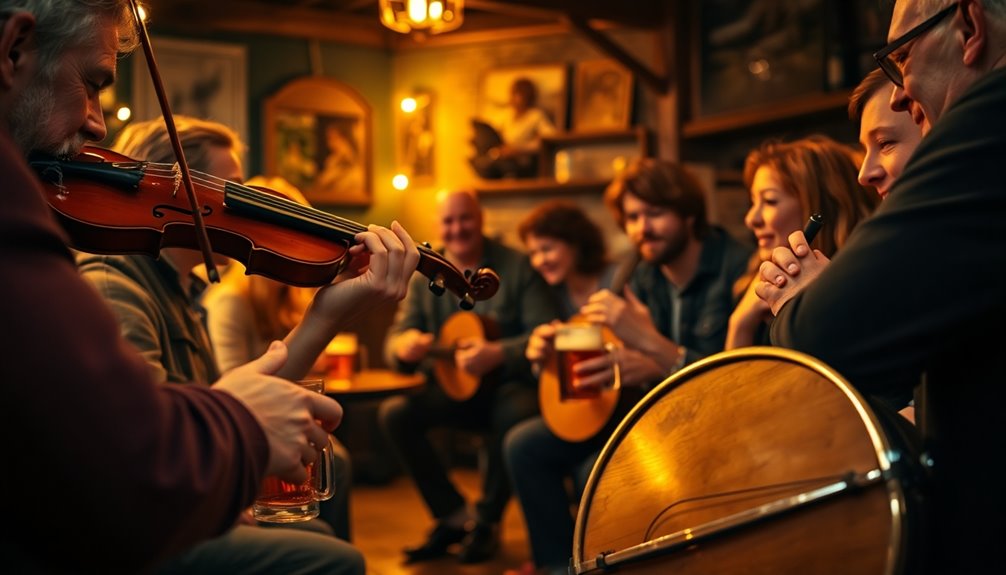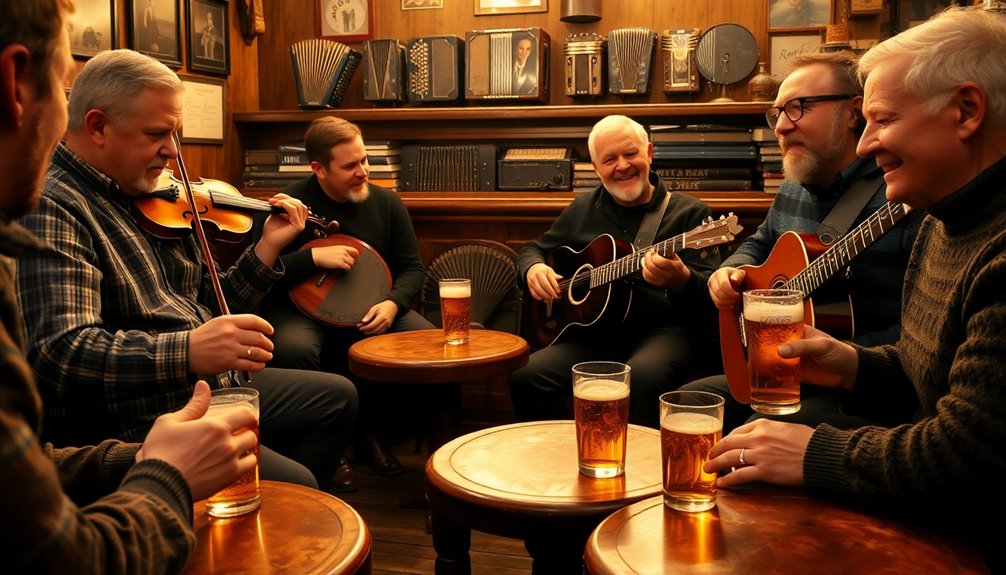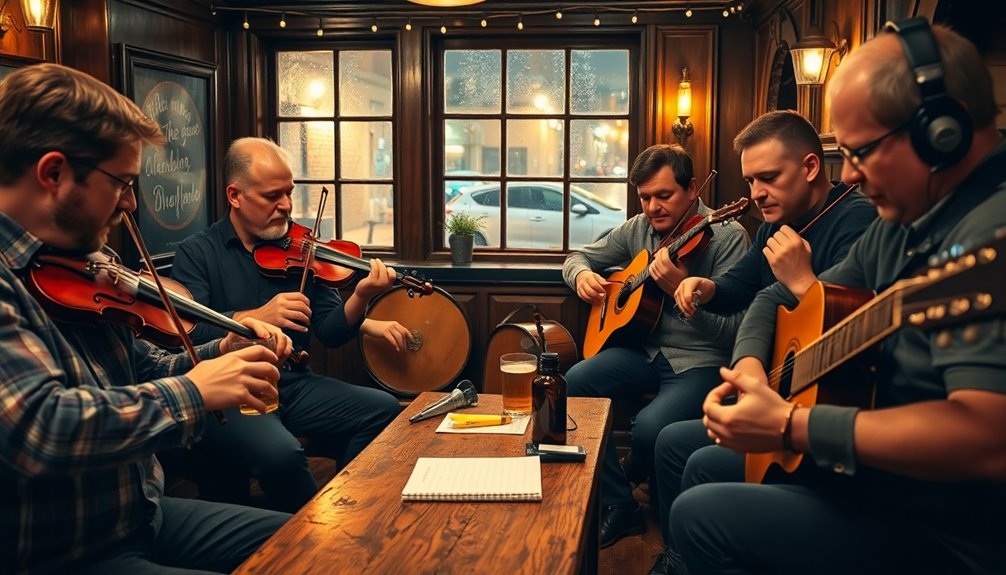
You’ll learn English faster and more naturally by joining Irish music sessions because they immerse you in real speech rhythms, regional accents, and everyday slang that textbooks don’t cover. You’ll sharpen listening and pronunciation by mimicking phrasing between tunes and practicing quick, polite chat between sets. Sessions also teach tune-specific vocabulary, cultural references, and conversational timing while building confidence in a supportive group. Keep going and you’ll pick up practical phrases, timing, and local color that boost fluency.
How Sessions Boost Listening and Pronunciation Skills
When you join an Irish music session, you get exposed to natural speech rhythms and regional accents that sharpen your listening and pronunciation much faster than textbook drills. You’ll lean into real-time listening techniques, following melodies and banter so your ear maps syllable stress and lilt without forced study. You can mimic phrasing between tunes, turning casual imitation into focused pronunciation practice that’s lively, social, and self-directed. Sessions let you experiment — you’ll drop formal stiffness, try local contractions, and adapt rhythmically to different players. That freedom speeds internalization: mistakes feel like steps, not failures. By staying present and copying what you hear, you’ll build clearer speech and more confident comprehension, learning on your terms.
Vocabulary You’ll Pick Up in Live Trad Sets
You’ll pick up a surprising mix of words and phrases in a live trad set: tune names (reels, jigs, hornpipes), tempo markers (lively, slow air), playing directions (cut, roll, ornament), and casual session talk (tune requests, friendly ribbing, tune origins). You’ll learn traditional phrases and practical music vocabulary that let you move freely in the room, call a tune, or praise a player. Below is a small rhythmic guide to what you’ll hear:
| Musical term | Meaning |
|---|---|
| Reel, Jig | Dance tune types |
| Cut, Roll | Ornamentation |
| Slow air | Expressive tempo |
| Tune request | Signal to start |
These words help you connect, improvise, and enjoy the session with confidence.
Conversational Practice Between Tunes
Want to keep the chat flowing without hogging the room? You’ll learn to read the room and jump in with short, confident lines that respect tune shifts. In sessions you’re practicing real dialogue dynamics: asking quick questions, offering brief compliments, and signaling when you want to listen or play. That balance gives you freedom to express yourself without dominating conversation. Use simple phrases, mirror rhythm and tone, and let pauses guide you—those gaps are invitations. You’ll polish timing, politeness markers, and natural contractions that make speech sound alive. Over time you’ll shift smoothly between chatting and playing, keeping exchanges lively and inclusive while sharpening practical speaking skills that travel beyond the session.
Understanding Cultural References and Slang

Although some phrases and references might seem mysterious at first, learning a bit of Irish cultural context and common slang will make the music sessions — and conversations around them — much easier to follow. You’ll pick up cultural nuances that explain jokes, place names, and storytelling styles. Slang expressions show up in toasts, introductions, and banter; knowing a few frees you to join in and feel free to be yourself. Use listening and asking to decode meaning, and note patterns rather than memorizing lists. The simple table below highlights how context, tone, and word choice change meaning:
| Context | Tone | Example meaning |
|---|---|---|
| Pub chat | Friendly | Compliment or tease |
| Storytelling | Wry | Local history lesson |
| Toasts | Warm | Celebration or goodbye |
Building Confidence Through Group Participation
Knowing a few cultural cues and slang makes listening easier, but joining in will really build your confidence. When you step into a session, you tap into group dynamics that reward participation over perfection. You don’t have to dominate; offering a tune, clap, or simple phrase lets you practice language naturally and claim space without pressure. Social interaction in that relaxed circle helps you test pronunciation, pick up idioms, and read body language, all while enjoying freedom to try and fail. Each small contribution shifts you from observer to participant, and others usually welcome newcomers. Over time, you’ll feel freer to speak, improvise, and connect—skills that transfer beyond music into everyday English conversations.
Practical Tips for Joining Your First Session
Pick an instrument that fits your comfort level and bring just what you need. Get there early to tune in, listen carefully to the group, and note the rhythm and phrases. When you’re ready, join in gradually—start with simple parts and build up as you feel confident.
Choose the Instrument
Instrument choice shapes how you’ll learn tunes, where you’ll sit in a session, and how easily you can join in. Pick an instrument that matches your energy and lifestyle — something portable if you want to move between sessions, or something steady if you like anchoring a set. Consider instrument selection practically: tuning, volume, and how it blends with fiddles, flutes, and bodhráns. Don’t force yourself into someone else’s favorite instruments; choose what excites you so practice feels like freedom, not chore. Start simple: learn a few reels on a concertina or basic accompaniment on guitar. You’ll feel more confident joining circles when your sound and comfort align, letting language learning flow naturally through music.
Arrive Early, Listen
Arrive a little early so you can soak in the room, hear tunes up close, and get a feel for the pace and key choices before you play. Your early arrival signals respect and gives you space to settle, tune, and practice attentive listening without pressure. Let the session’s rhythm guide you; freedom comes from knowing the landscape.
- Watch how players phrase melodies and ornaments—note dynamics and tempo.
- Listen for common keys and chord patterns to anticipate changes.
- Observe seating and eye contact cues so you know where you’ll fit in.
- Use quiet moments to ask brief questions; people usually welcome curiosity.
Arriving early and listening closely lets you join confidently when the time’s right.
Join in Gradually
When you’re ready to join, start small: wait for a tune you know well or a slower set, take a seat where you can see others, and signal quietly—eye contact, a nod, or a soft entry—so people know you’ll come in. Then breathe, listen for the phrasing, and match rhythm rather than perfection. You’ll want gradual participation: add a phrase or two, then step back, letting confidence grow. Use simple tunes to practise timing and casual chat between tunes to build social integration without pressure. Keep choices flexible—sit out when you need to, jump in when you feel free. This approach keeps learning joyful, sustainable, and respectful of both your pace and the group.
Making the Most of Session-Based Language Exchanges

If you want to boost your English while enjoying Irish music sessions, treat each exchange as a focused practice round: set a clear goal, choose a couple of language points to work on, and decide whether you’ll concentrate on listening, speaking, or vocabulary that night. You’ll blend session etiquette with relaxed fun, using language immersion to learn naturally. Be bold but respectful; freedom means you choose how much you try.
- Arrive with a simple aim (ask questions, shadow phrases, grab new words).
- Pair up for mini-practices between tunes to focus on pronunciation or idioms.
- Keep a tiny notebook for fresh vocab and quick translations.
- Reflect briefly after the session: what felt free, what needs more focus?
Some Questions Answered
Do Sessions Require Musical Ability to Join?
No, you don’t need musical skills to join; sessions welcome all levels. You’ll learn by listening, respecting session etiquette, chiming in when ready, and enjoying the freedom to explore tunes, conversation, and community at your pace.
Can I Attend Sessions Alone as a Beginner?
Yes — you can go solo; think of the session as a friendly harbor where you’ll unfurl sails. Bring beginner tips, embrace the solo experience, ask, listen, join in gradually, and enjoy the liberating rhythm.
Are Sessions Family-Friendly or Age-Restricted?
Yes — sessions welcome families and aren’t age-restricted, so you’ll enjoy family participation and age inclusivity; you can bring kids or grandparents, relax, join freely, and share music without rigid rules or limitations.
How Do I Find Sessions in Non-Irish Cities?
Search session directories and social media to locate local communities; you’ll find listings, venue nights, and informal groups. Tap community boards, music schools, and expat forums — you’ll join welcoming players and freedom-loving listeners.
Is There a Cost to Join Most Sessions?
Most sessions are free or pay-what-you-can, but some have session fees or membership options for regulars. You’ll choose what fits your freedom and budget, so you won’t feel tied down by rigid costs or rules.
